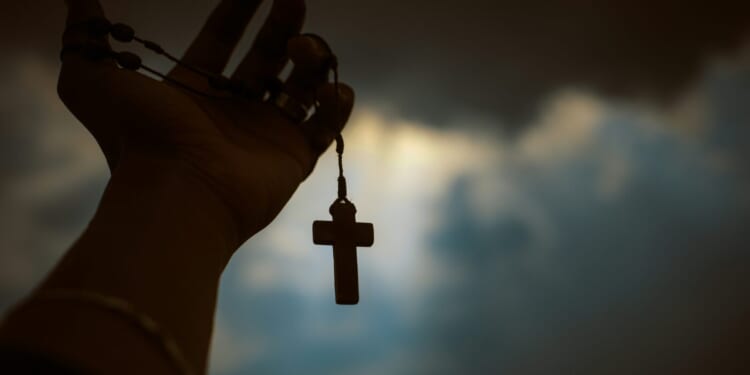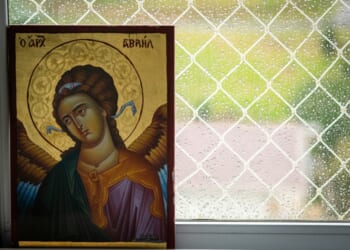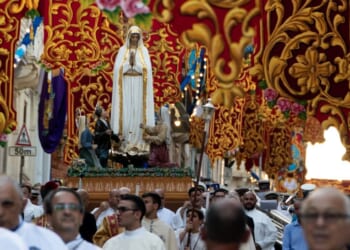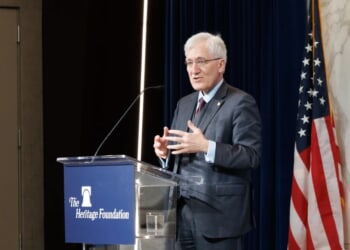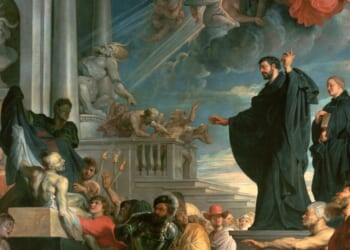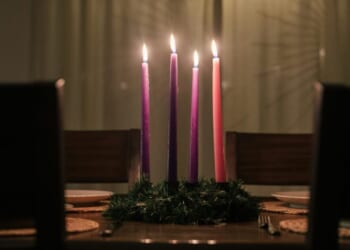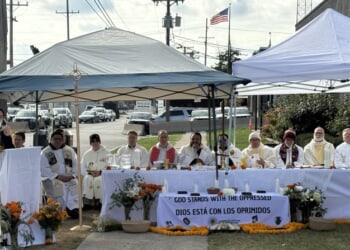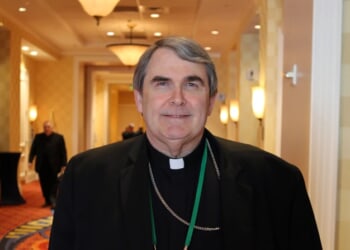When I think about my spiritual journey as a Catholic over the past twenty-five years, lots of words come to mind—desire, longing, rest, fulfillment…and embarrassment. Embarrassment because, while I knew I loved God and had found my spiritual home in the Church, I didn’t always live like a Catholic should. Without a Catholic upbringing, and with only a rudimentary catechism during my formation as an eighteen-year-old convert, I floundered for years to put the old man to death. To be saintly. To “be good.”
But as we know in scripture, “No one is righteous, no not one” (Rom. 3:10), and “A just man falls seven times and rises again” (Prov. 24:16). We know, too, that none of us is perfect while on this earth, and that, while the Lord says that those who love Him keep His commandments, He also knows when we will fall and gives us the grace—through contrition and the Sacrament of Confession—to do penance and amend our lives.
There is literally nothing we lack in order to do His will at all moments of every day, for He has already won the victory and made it possible for us to share in it. When we stray and step off the path into the brambles of sin, He comes in after us, with the lacerations and blood to prove that He will never stop seeking us out in order to bring us home.
As I have gotten older, and that grace has perfected my nature (or at least made strides towards doing so), I’ve become painfully and acutely aware that this is not my final home. Like many Catholics on the same path, I long to live in that heavenly Kingdom forever, safe in the arms of the Savior, where sin, pain, and embarrassment do not abide. But my time is still here on earth, where the laborers are few.
When I desperately asked an old monk when the struggle with sin and concupiscence will end, he replied, “the day you die.” In those early days of my faith journey, just staying in a state of grace was hard enough; as the years have gone by, and God has supplied the grace to not tire of “rising again,” strides have been made, but the end is a long way off, and I still see how far I have to go.
It is not naturally possible to ascend the divine ladder apart from Him, but with God all things are possible. And so we hope.
Part of the embarrassment during those years (and now, at times) of failing in charity, falling and getting up again, is the haunting of that seemingly childish dream from my early years as a Catholic: I want to be a saint.
When we deny our Lord, like Peter, the Devil is right beside us to exploit those hopes and holy aspirations with the usual whispers: Just who do you think you are? I know you and what you’ve done. You will never get “there.” You’re a nobody. You’re foolish. Heaven is not for the likes of you.
And I’ve listened to him. I know he lies, that he’s the Father of Lies. Still, I’ve listened. But then I looked to those who have gone before, who have run the race and won the crown of glory. Those with names, known throughout history by all the faithful and whose cards and icons adorn our house and who are remembered for centuries, those past and those still to come.
On the canonization of St. Carlo Acutis, rather than joyfully celebrating with other Catholics, I harbored a secret envy (even while venerating a clipping of his hair after Mass). Why couldn’t I have died young? Why can’t I be good (like Carlo)? And while I know God supplies aspiring soldiers in the Church Militant with the noble virtue of magnanimity to bolster the desire to run the race, win the crown, and be known throughout history through the formal process of canonization, it reminded me of one of my favorite saints I have a special affinity for.
St. Mark Ji Tianxiang was a medical doctor in mid-nineteenth century China, a faithful Catholic who inadvertently got addicted to opium when using the drug to treat a stomach ailment. Because his confessor did not believe he had a firm resolution to avoid further sin, he was denied absolution and abstained from Holy Communion (while still attending Mass) for thirty years. During the Boxer Rebellion of 1900, still addicted to and using opium, he was rounded up with other Christians and made to deny his faith. He refused and died as a martyr by beheading. He was formally canonized in the year 2000 by Pope John Paul II. He had earned the crown.
In an age of mobile phones and the internet, it is far too easy to excuse and take lightly all those idle words we use, snarky comments we write, and uncharitable text messages we send. And unlike in the pre-internet age, many of those words are right there on the screen and logged on a server, able to condemn us to Hell (see Mt. 12:36). I have thus despaired, given that I am far from perfect in charity, that not only will I never be a saint (let alone a great saint), but that even if I was, the process of canonization would be so revealing that, when these things would be uncovered and reviewed, the Vatican would instantly dismiss the case!
I know this is a lie from the Devil. Peter denied Christ three times—and not as an unbeliever like Saul before his Damascus Road moment, but as a faithful disciple and one of Jesus’ closest friends. And yet our Lord had the audacity to make him the head of the universal Church. How can one recover from such a shameful betrayal? Might our Lord be trying to set an example for us of what is possible for God, when things are literally impossible for man alone?
So, as the Feast of All Saints approaches, I have found the loophole. I will rebuke the Accuser and strive still to be a saint, despite my many failings—a saint unnamed like those millions of souls enjoying blessed repose with our Lord in Heaven, not known to us by name. For those who die in His grace and with virtues unseen, the end is the same, whether we are known by millions or whether we die in hidden obscurity, “for the Lord sees the heart,” as it says in scripture (1 Sam. 16:7). And I know, like Peter, that I share in the spirit of his response, “Lord, you know that I love you” (Jn. 21:17). In all my imperfections. In all my denials.
I may not have hope that anyone will be asking for my intercession from Heaven by name in the distant future. I may not die a martyr, like my hero St. Mark Ji Tianxiang, or be a great figurehead, like St. Peter. But it doesn’t matter. Both the named and the unnamed have found their final home and will be there for all eternity, co-mingled together like the blood and water that flowed from the side of Christ on the Cross. I share the hope of the universal Church to one day be seated at the feast alongside them.
Photo by Gift Habeshaw on Unsplash

